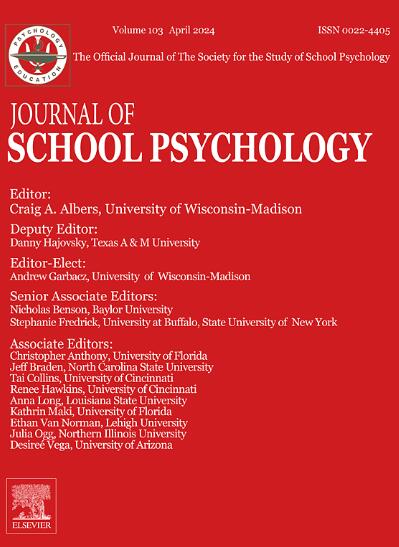Accounting for learning environments in academic screening
IF 4.1
1区 心理学
Q1 PSYCHOLOGY, SOCIAL
引用次数: 0
Abstract
Within multi-tiered systems of support (MTSS) practice and research, students' need for academic intervention is often determined by comparison of students' screening scores to cut scores. We examined the degree to which the relationship between students' fall screening data (i.e., Measures of Academic Progress) and their outcome on a spring summative state test related to the quality of the classroom learning environment and how core instructional strategies influenced this relationship. Fall screening data and spring state test outcomes in English/language arts (ELA) and math were analyzed from a sample of 72 teachers and 1554 third-grade students. Multilevel logistic regression revealed that the association between students' ELA or math skills at the beginning of a school year and state test at the end of the year were not identical across classrooms (odds ratios range = 0.81–0.92). A significant interaction was observed between students' fall ELA screening scores and teachers' instructional strategy use in predicting state test outcomes (p = .03). Teacher strategy use was found to be a significant contributor to false positives in screening decisions based on optimal cut scores for ELA (p = .003), but not math.
在学术筛选中考虑学习环境
在多层支持系统(MTSS)的实践和研究中,学生对学业干预的需求通常是通过比较学生的筛选分数来确定的。我们研究了学生的秋季筛选数据(即学业进步测量)与他们在春季总结性状态测试中与课堂学习环境质量相关的结果之间的关系程度,以及核心教学策略如何影响这种关系。对72名教师和1554名三年级学生的英语/语言艺术(ELA)和数学的秋季筛查数据和春季状态测试结果进行了分析。多水平逻辑回归显示,学生在学年开始时的ELA或数学技能与学年结束时的州测试之间的关联在各个教室中并不相同(优势比范围= 0.81-0.92)。在预测州试结果时,学生的秋季ELA筛选分数与教师的教学策略使用之间存在显著的交互作用(p = .03)。教师策略的使用被发现是基于ELA最佳cut分数的筛选决策误报的重要贡献者(p = 0.003),但不是数学。
本文章由计算机程序翻译,如有差异,请以英文原文为准。
求助全文
约1分钟内获得全文
求助全文
来源期刊

Journal of School Psychology
PSYCHOLOGY, EDUCATIONAL-
CiteScore
6.70
自引率
8.00%
发文量
71
期刊介绍:
The Journal of School Psychology publishes original empirical articles and critical reviews of the literature on research and practices relevant to psychological and behavioral processes in school settings. JSP presents research on intervention mechanisms and approaches; schooling effects on the development of social, cognitive, mental-health, and achievement-related outcomes; assessment; and consultation. Submissions from a variety of disciplines are encouraged. All manuscripts are read by the Editor and one or more editorial consultants with the intent of providing appropriate and constructive written reviews.
 求助内容:
求助内容: 应助结果提醒方式:
应助结果提醒方式:


